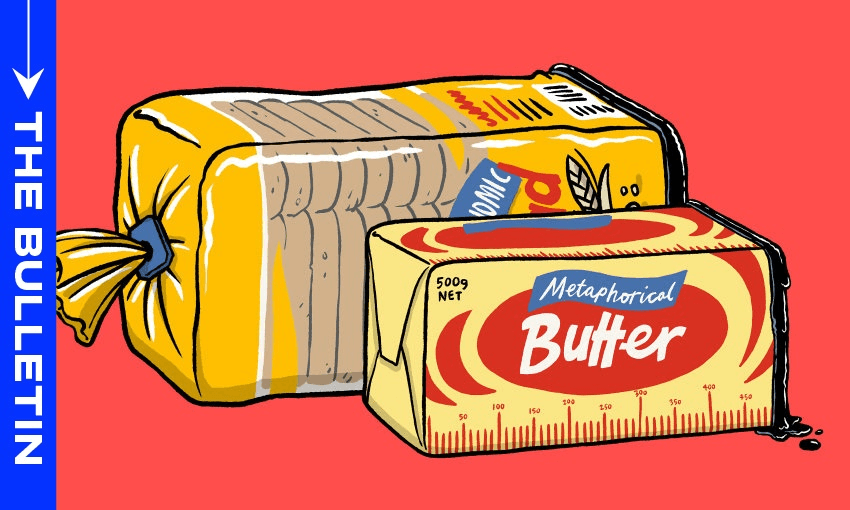GDP data out today is expected to show economic growth. It may also debunk the idea that we were ever in a recession at all. Will it have any bearing on this bread and butter election, asks Anna Rawhiti-Connell in this excerpt from The Bulletin, The Spinoff’s morning news round-up. To receive The Bulletin in full each weekday, sign up here.
Support for Labour and National drops, National and Act could govern, just
Last night’s 1News Verian poll (there’s one every Wednesday until the election) yielded pretty similar results to the last few polls. National and Act can govern (just), with National down two at 37% and Act up two at 12%. Labour is down one at 27% and the Greens are up two at 12%. NZ First is once again over the threshold at 5% and Te Pāti Māori is steady at 3%. As with last week’s polls, the peripheral questions threw up a couple of more insightful nuggets. The poll asked if political parties should be upfront about coalition agreements prior to the election. 82% said yes. That question is currently most relevant to National who can not say they’re clear of needing NZ First to help form a government. Newsroom’s Jo Moir writes that ruling out New Zealand First would only serve to back Luxon into a corner so he won’t do it.
Lift in New Zealanders who think the economy will improve
As the Herald’s Thomas Coughlan points out, overseas votes can be cast from September 27 and advance voting starts on October 2 giving Labour a short runway to turn things around. In 2020, just under just under 2 million votes were cast before election day. Newsroom’s Marc Dalder finds a bit of hope for Labour in another poll question. The number of New Zealanders who believe economic conditions will improve over the next year has risen to 40%, while the proportion who think they’ll worsen is down to 27%. Small and possibly cold comfort for Labour, with the Ipsos Issues Monitor showing New Zealanders are backing National as being most capable of managing almost every major issue of concern including inflation/the cost of living and the economy.
GDP data out today and may show we haven’t been in recession at all
I have to fall on my sword here because I said the Prefu forecasts and Stats NZ data out last week provided a final snapshot of the economy before the election. I forgot about GDP data which might be like forgetting about Dre except economists say it has less bearing on the Reserve Bank’s view of inflation pressure (paywalled) than other measures. GDP data is out today, and most economists are picking we’ll see a small lift in economic growth. They’re not waving a victory flag, however. ANZ’s chief economist Sharon Zollner said the data was volatile due to so many events, but it was clear “economic momentum is softening”. I’ve been told I’m a pedant for pointing out that you can’t say “we’re in a recession” in the present tense because GDP data is retrospective, so I’ll shut up about that but there’s actually a chance that adjustments made to data from the last quarter of 2022 and the first quarter of 2023 will show we were never in a recession at all.
Big ‘E’ and little ‘e’ economy
Christopher Luxon has been making a political meal out of the fact that we’re the only country in the Asia-Pacific region to be “in a recession.” His beans and carrots rhetoric may lose some of it’s flavour today but it might not matter. If it vibes like “recession” and “bad economy”, it’s harder for technical economic information to slow that roll. Yesterday, news landed that our current account deficit has shrunk by more than economists predicted (that’s good-ish) but petrol prices may also hit $3.50 p/l by Christmas. Standard & Poor’s global chief economist Paul Gruenwald said New Zealand’s economy was in good shape last week, but a dozen eggs cost $9.30 last month. Last year I wrote a Budget Day preview and made a distinction between Budget with a big “B” and budget with little “b” to differentiate the government’s spending on big policy set pieces like health reforms from the growing strain of rising food and petrol prices on household budgets. It feels like we need to talk about “the economy” in the same way and the situation has reversed with big, long-term set pieces out and smaller alleviation measures in. The big ‘E’ Economy, or lack of big vision policy beyond somehow “growing the economy” or “managing the economy” is something economists, funnily enough, seem to be increasingly screaming into the void about. Obviously, big macroeconomic stuff is closely related to the smaller ways we feel strained but saying the economy is good or bad means different things to different people and we may find hard economic data is no match against the nebulous “mood for change”.
